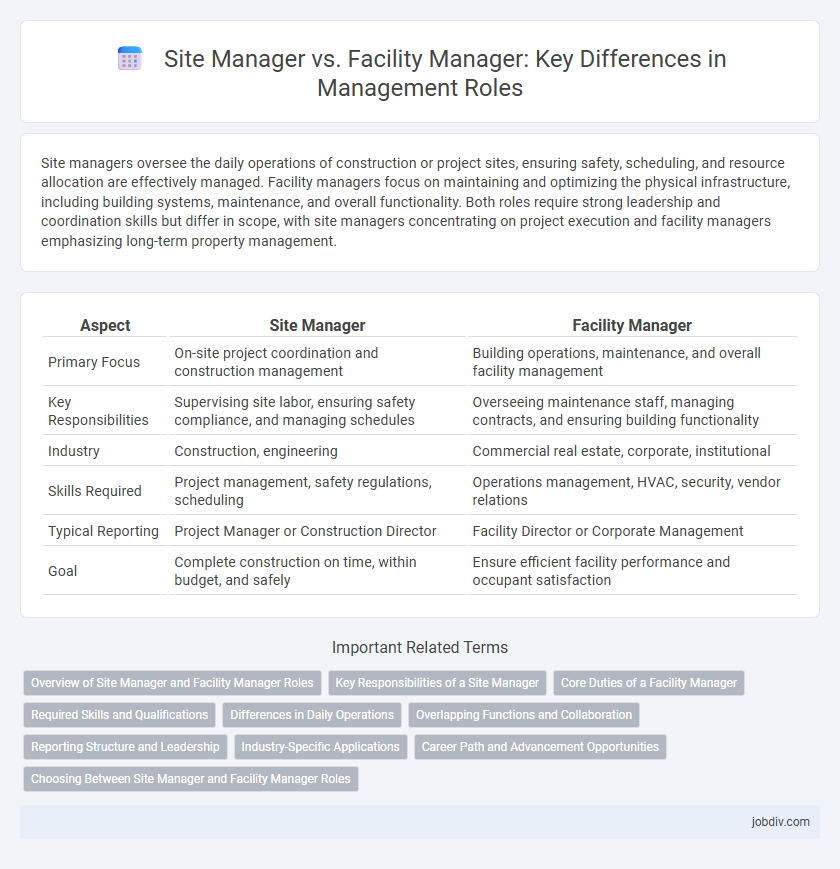Site managers oversee the daily operations of construction or project sites, ensuring safety, scheduling, and resource allocation are effectively managed. Facility managers focus on maintaining and optimizing the physical infrastructure, including building systems, maintenance, and overall functionality. Both roles require strong leadership and coordination skills but differ in scope, with site managers concentrating on project execution and facility managers emphasizing long-term property management.
Table of Comparison
| Aspect | Site Manager | Facility Manager |
|---|---|---|
| Primary Focus | On-site project coordination and construction management | Building operations, maintenance, and overall facility management |
| Key Responsibilities | Supervising site labor, ensuring safety compliance, and managing schedules | Overseeing maintenance staff, managing contracts, and ensuring building functionality |
| Industry | Construction, engineering | Commercial real estate, corporate, institutional |
| Skills Required | Project management, safety regulations, scheduling | Operations management, HVAC, security, vendor relations |
| Typical Reporting | Project Manager or Construction Director | Facility Director or Corporate Management |
| Goal | Complete construction on time, within budget, and safely | Ensure efficient facility performance and occupant satisfaction |
Overview of Site Manager and Facility Manager Roles
Site Managers oversee construction projects, ensuring work aligns with timelines, budgets, and safety standards while coordinating subcontractors and materials on-site. Facility Managers handle the maintenance, operation, and security of existing buildings, managing services like HVAC, cleaning, and space utilization to support business continuity. Both roles require strong organizational skills but differ in focus: Site Managers concentrate on construction progress, while Facility Managers prioritize ongoing building functionality.
Key Responsibilities of a Site Manager
A Site Manager oversees construction projects, ensuring adherence to timelines, safety regulations, and budget constraints while coordinating subcontractors and suppliers. They manage daily operations on-site, monitor progress, and resolve issues to maintain project quality and compliance. Their role requires strong leadership, communication, and problem-solving skills to deliver successful project outcomes.
Core Duties of a Facility Manager
Facility Managers oversee the operational efficiency, maintenance, and safety of buildings and infrastructure, ensuring compliance with health, safety, and environmental regulations. Their core duties include coordinating space management, managing budgets for building services, and supervising maintenance staff to optimize facility functionality. Unlike Site Managers who focus on day-to-day construction or project-specific activities, Facility Managers maintain long-term asset management and sustainability of the entire facility.
Required Skills and Qualifications
Site Managers require strong project management skills, including scheduling, budgeting, and compliance with safety regulations, often supported by a construction-related degree or certification. Facility Managers need expertise in building maintenance, HVAC systems, and vendor management, typically backed by qualifications in facility management or engineering. Both roles demand excellent communication, problem-solving, and leadership abilities to effectively coordinate teams and resources.
Differences in Daily Operations
Site Managers primarily oversee construction projects, coordinating labor, materials, and equipment to ensure timelines and safety standards are met. Facility Managers focus on maintaining building systems, managing repairs, security, and daily operational efficiency of occupied spaces. While Site Managers handle project-specific tasks during construction phases, Facility Managers ensure the ongoing functionality and comfort of facilities post-construction.
Overlapping Functions and Collaboration
Site Managers and Facility Managers share overlapping functions such as overseeing maintenance, ensuring safety compliance, and coordinating vendor services to optimize operational efficiency. Collaboration between these roles enhances resource allocation and minimizes downtime by aligning site-specific needs with facility-wide strategies. Clear communication channels and defined responsibilities are essential to avoid conflicts and improve project delivery outcomes.
Reporting Structure and Leadership
Site Managers typically report directly to project directors or construction managers, overseeing daily operations and coordinating on-site activities, while Facility Managers often report to corporate management or operations directors, focusing on long-term maintenance and facility services. Site Managers lead teams centered around construction, safety compliance, and workflow efficiency, whereas Facility Managers guide interdisciplinary teams dedicated to building systems, space management, and service delivery. The leadership role of Site Managers is outcome-driven with an emphasis on project milestones, contrasting Facility Managers' strategic leadership focused on sustainability, asset management, and occupant satisfaction.
Industry-Specific Applications
Site Managers specialize in construction, manufacturing, and industrial projects, overseeing project timelines, safety compliance, and workforce coordination to ensure efficient site operations. Facility Managers focus on building maintenance, infrastructure management, and operational efficiency within commercial, healthcare, and educational settings, optimizing asset performance and occupant comfort. Industry-specific applications dictate that Site Managers handle project execution complexities while Facility Managers prioritize long-term operational sustainability.
Career Path and Advancement Opportunities
Site Managers typically advance through roles in project coordination and construction supervision, leveraging technical expertise to oversee daily operations on construction sites. Facility Managers often progress from maintenance or operations roles, expanding into strategic planning and sustainability management to optimize building performance. Career advancement for Site Managers may lead to Senior Project Manager or Construction Manager positions, while Facility Managers can move into Corporate Real Estate Manager or Director of Facilities roles.
Choosing Between Site Manager and Facility Manager Roles
Choosing between site manager and facility manager roles depends on the scope of responsibilities and project focus. A site manager oversees daily operations and construction activities on a specific project location, ensuring safety, schedules, and compliance, while a facility manager handles the maintenance, security, and functionality of existing buildings and infrastructure. Evaluating whether the priority is managing active construction sites or maintaining operational facilities guides the optimal career path decision.
Site Manager vs Facility Manager Infographic

 jobdiv.com
jobdiv.com